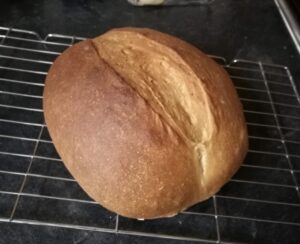Your Recipe For Success
“I want some of Daddy’s bread!”
The bread I bake is a real winner in our house.
It’s been refined over a hundred loaves and several years working at it. It’s a combination of ingredients and technique: from the ratios of flour to oil and water, how I prepare the baking sheet I use, the setting on my oven and the time I set on the timer (now 42 minutes rather than 40 to help get the crust just right).
I could give you the recipe and you would scratch your head a lot.
- You set your oven to Gas Mark 5-and-a-half?!
- What do you mean, leave it for “about” two hours to prove?!
- Wait wait, a mix of 400g of “whatever bread flours” you happen to have???
There are elements of what I could share that would make sense. There are others that with a little thought you would be able to work around. And there are some which are only applicable to my kitchen, my house, my equipment.
I read books, watched YouTube videos, looked at what I had, looked at what I could get and with time, patience, practice, repetition, iteration and a smile on my face I found something that worked really well for me and my family. I could tell you all about it, but if you wanted to do something similar, you could only use what I shared as a starting point. You would have to take what I offered and build on it, although hopefully, I would save you some time in your quest to get your own recipe for success.
This train of thought is really about you, your research, your thesis, your viva prep, and about people giving advice.
Let’s assume it’s good advice! Even then, you have to make it work for you. You have to take ideas on writing, on reading, on working well, on finishing a thesis, on preparing for the viva and on being in it – all of that has to get mixed with you, your talents, your skills, your passions, your preferences. The work you’ve done, the worries you have and your situation. It takes time and work to make it truly useful for you. It might not be easy, but hopefully it won’t be as hard as starting with a blank page.
With a little time, a little practice, a little refinement – whatever stage you’re at – you can find your recipe for success. It might require tinkering, but so long as you persist, you can get it just right.
And once you have found your recipe for success – research success, thesis success, viva success – consider sharing it to help others in their work. Find a good way to tell your colleagues what’s helped you.
